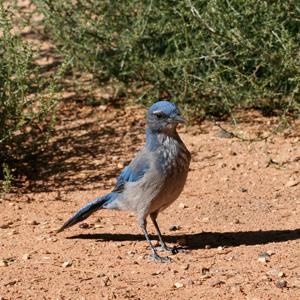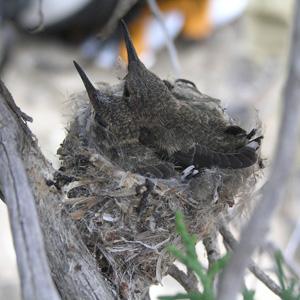分享到

Plants don't have ears, right? At least not the kind we hear things with, which is why researchers haven't given much thought to the effect of noise and noise pollution on plants.
But all that could be about to change.
In northwestern New Mexico's Rattlesnake Canyon, gnarled juniper trees and pi?on pines dominate a landscape of high mesas and rough sandstone cliffs.
Tucked in among the trees are thousands of natural gas wells. About one-third of them are pressurized by ear-splitting compressors.
"They run 24 hours a day, 365 days a year, with the exception of periodic maintenance, so they are going all the time." That's Clinton Francis of the National Evolutionary Synthesis Center in North Carolina.
Since 2005, he's been studying how Rattlesnake Canyon's birds respond to the compressors' non-stop racket.

"Black-chinned hummingbirds, for example, tend to prefer and settle in really noisy landscapes, and western scrub jays tend to avoid these noisy areas," Francis says.
So the noise in the canyon is changing the way the birds behave. And that got Francis wondering whether that's having an effect on plants the birds interact with. Take pi?on pine trees and scrub jays, for example.
"We know that jays are really important seed dispersers for pi?on pine," he says.
The jays bury the seeds to snack on later, but inevitably, some get forgotten and grow into new pine trees.
Francis already knew there were fewer pine seedlings at noisy sites. Was that because the noise was keeping the jays away from their pine nuts?
Francis set up motion-trigger cameras at both noisy and quiet sites, put out some pine seeds, and waited.
As he predicted, jays avoided the noisy sites, not stashing any nuts there.
"We only found them removing seeds on the quiet sites," he says.
That observation confirmed what Francis had expected: jays were only collecting and burying seeds at quiet sites.

But that wasn't the only thing the cameras saw. At the noisy sites, mice were gobbling up the seeds, leaving nothing behind to sprout.
So for the pine trees, it looked like the compressor noise was delivering a double whammy.
"We're just not getting as many seeds going into the seed bank in noisy areas, and the ones that do might be consumed by the mice that are there."
But Francis says the effects of the noise on the canyon's plants weren't all bad. A flower pollinated by hummingbirds did better near the compressors. Remember, hummingbirds seem to like the noise - probably, Francis says, because it drives away the scrub jays that would otherwise eat the hummingbirds' eggs and young. Francis just published his study in the British journal called Proceedings of the Royal Society B.
University of California Davis ecologist Gail Patricelli also studies how gas drilling noise affects birds - in her case, the greater sage grouse. She says as far as she knows, Francis's work is the first to show how noise impacts plants.
"You kind of hit yourself on the forehead and think, why didn't I think of that?" Patricelli says.
I reach Patricelli on her cellphone at a remote field site in Wyoming. She says even there, it's not quite.
"We hear airplanes, we hear roads going, you know, way off in the distance that are too far away to see, and yet you can still hear them," she says. "Because sound travels much, much further than a lot of the other types of disturbance. And so it's just an enormous land area that's impacted by noise and we know remarkably little about what that noise does to the ecosystem."
But it seems likely that for long-lived species like the pi?on pines in New Mexico's Rattlesnake Canyon, the effects of noise may continue to reverberate long after the sound of the compressors has gone silent.
juniper: 杜松
scrub jay: a blue and gray jay with a long slender body and no crest, found in dense brush or scrub especially in the Florida peninsula 灌叢鴉
(來源:VOA 編輯:旭燕)
分享到
關注和訂閱


電話:8610-84883645
傳真:8610-84883500
Email: languagetips@chinadaily.com.cn